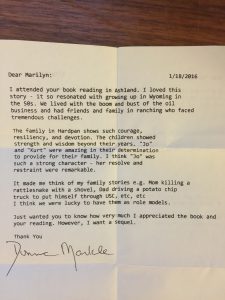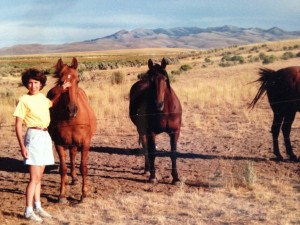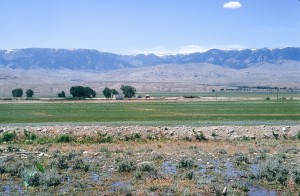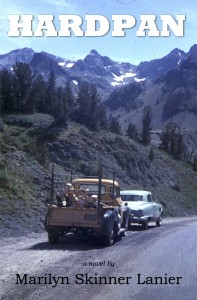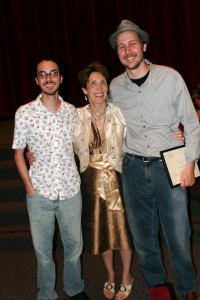Clark, Wyoming. Summer 1956
“When will you pick us up, Daddy?” Jean asked.
“After mowing.”
“Don’t forget us!” Linda shouted at his back as he leapt across the dry creek bed to his pickup.
He glanced around. “I won’t. Now remember, girls. Keep the sheep away from that hole in the fence.”
“We will, Daddy.” They waved in unison, like cowgirls at a rodeo.
He spun a u-turn back to the ranch. Gravel scattered everywhere. The billowing dust cloud thinned gradually to a single horizontal band wafting over the road.
Linda squeezed Jean’s small hand. It felt clammy. She wondered how they would keep the sheep from crossing the road if the herd came their direction. Their house sat high on the riverbank above the Clarks Fork as it flowed to the Yellowstone. Though two stories high and only two miles away, it looked like a playhouse with the Absarokas towering behind.
Jean wrested her hand free. “What are we going to do now?” She started poking around the dry ditch bed, kicking the chunks of dirt with her faded tennis shoe.
Linda stared at the small pile left behind by her father for their sheep-watching job: an old army blanket, a metal lunch pail filled with roast beef sandwiches and cookies, and a Thermos of lemonade. Her mother had made the sandwiches before breakfast while Linda stuffed a sheaf of paper dolls and a bag of marbles into a homemade cotton bag for her and Jean.
She shoved the blanket into Jean’s arms. “Here. Take this near the fence. I’ll bring the rest.”
Jean sidled up the ditch bank toward the fence post that was dangling from two loose strands of barbed wire. Linda trudged closely behind with the rest of their gear.
“There’s a good place to spread the blanket.” Jean pointed out the clumps of bunch grass near the post. Pale green patches bordered the golden field of wind-swept grasses.
Jean tossed the frayed army blanket over the grass. The girls stomped hard to flatten the blanket over the sticky hillocks. Linda plunked her load down and grabbed some rocks to hold the blanket corners.
“These rocks are too small. One burst of wind and this blanket will be stuck on that barbed wire.”
Jean gazed at the small band of sheep lolling across the field. “That’s funny. Maybe the blanket would scare the sheep away, like a scarecrow.”
“I doubt it. They’re too dumb to notice.”
Linda stepped off the blanket to check out the post dangling mid-air. The sprung wire still pointed to the sky. When she pushed against the post to see how much spring was left, the top row of barbed wire groaned from the strain. She stopped, afraid another strand could pop loose.
The morning seemed to stretch forever. The girls ate the two giant oatmeal cookies from the lunch pail before the sun reached its noontime zenith.
“What can we do now?” Jean asked her older sister.
Linda scooped up some pebbles from the edge of the ditch and slipped them into Jean’s hands. “Here you go. Let’s see if we can get the sheep’s attention.” They tossed pebbles in the direction of the grazing sheep across the rocky field, but the sheep were unfazed by the commotion.
“Guess they’re not going to charge the fence,” Linda said.
Linda dug into the cotton bag. “Look. I brought some of my paper dolls.” She handed Jean the Betty Grable doll outfitted in a one-piece bathing suit, and kept the Debbie Reynolds doll for herself. They sat down on the army blanket and started pushing the little white tabs over the dolls’ shoulders. A gust of wind came out of nowhere. The cutouts fluttered out of reach before touching down on nearby sagebrush.
Jean dived to salvage their treasures. “Got them!” she squealed. She held a crumpled Betty Grable evening gown in one hand and the Debbie Reynolds doll in the other.
“Look what you’ve done. They’re wrecked.”
“Nuh-uh. I can straighten them out. Just watch.” She tried to flatten the mashed cutouts on her leg. Debbie Reynolds’ neck was broken at an angle, her face flopping against her chest.
“Don’t bother.” Linda stomped away, determined not to speak to her sister the rest of the day.
The heat of the simmering day finally broke the silence. “Why don’t we play a game? Next time we see a car coming, let’s get ready to wave. Maybe they’ll stop, and we can ask what time it is.”
”Okay.”
It seemed like hours before they saw the next dust cloud erupting on the road from Belfry, the nearest town.
“A car‘s coming!” Linda hollered.
The girls ran to the edge of the ditch bank along the road, positioning themselves for action.
When the gray sedan came close, the girls waved and whistled. Jean held out her red kerchief as if to signal a racecar. ”It’s the Kowalski’s!” Linda yelled.
The car slowed to a halt. Linda recognized Mr. Kowalski. His ranch bordered the road across from their sheep field. As he strode toward them, she forgot to ask him the time.
“What are you girls doing out here on this hot summer day?”
“Daddy wants us to guard the sheep so they don’t cross the road and eat your mowed hay. He said green hay can bloat their stomachs,” Jean said.
Linda pointed to the broken fence. “Sissy’s right. The fence is broken and Dad wants us to guard the sheep until he can fix it. The posts are rotten, so he has to buy new ones. Wanna see?”
“Sure.”
The girls led him across the dry ditch to the stretch of fallen fence. They stepped over sagebrush to get a close look.
“Yep. It’s in bad shape. Bet your dad hasn’t been able to tear himself away from haying to fix it.”
“That’s right!” they beamed, grateful that he understood.
Mr. Kowalski bent down to pick up something in the grass. “Look here. It’s a piece of rusted barbed wire. Must’ve sprung loose when your father tightened the wire last time. Don’t want you girls stepping on it,” he said, tossing it into the posthole.
“That’s nasty-looking!” Linda said. “Like I said, I’m sure Dad will fix this fence soon.”
”No doubt. Tell your dad I’ll be glad to help him out if he wants. Well, I’ll be going. You girls take care now.” He straddled the ditch to get to his car.
“Sure will,” Linda said. The girls waved as his car dropped out of sight below the river bench.
Something nagged at her. She could hear her father telling their mother weeks ago, “I’ve got to get that damned fence fixed.” But most of the summer was gone and the fence was still down. Her father didn’t want to use his hired men to do the job, and he didn’t like to ask the neighbors for help. He’d wait until the haying season was over and do it himself.
Only a few cars drove by after Tom Kowalski left. Some of them had honked but none had stopped. The girls could tell it was getting close to noontime by the shortness of their shadows on the ground. Jean’s growling stomach was a good sign too.
”I’m hungry,” she said.
”Me too. Let’s sit on the blanket and get our lunches out,” Linda said.
They stomped again on the bumpy spots until the blanket was flat enough for them to sit down. Before long, they were sharing slurps of lemonade from the Thermos bottle and taking bites of their roast beef sandwiches.
Linda saw the dust cloud of the oncoming car first. “It’s coming from Belfry. We’d better hurry. I don’t want to miss this car!” Linda shoved leftover sandwich pieces into the pail and stood up to flag down the car.
The car was finally in sight. They yelled and Jean waved the red kerchief until the car rolled to a stop. A scrawny man about their father’s height stepped out of the old Studebaker. He was wearing Levi’s and a long-sleeved plaid shirt with pearl buttons. He took his time coming around his car to the girls’ side of the road. He looked their father’s age, in his thirties. But his face was pale and his cheeks caved in, as if he needed a home-cooked meal more than a job.
“Could you tell us the time?” they asked. They stood together on the other side of the dry ditch in front of the broken fence, several feet away from him.
He stood still, closely inspecting the girls. His cheeks were sunken and lined with deep creases. His thin lips looked stuck together by glue, as if they held some big secrets. Linda began to feel queasy over his long silence.
”The time? You don’t know it’s past noon already?” he said at last. He pulled a round watch from his front pocket. “It’s a quarter-to-one.”
He picked up the conversation, shifting to a voice so soft they could barely hear. “How’re you girls doing today?”
As the man tugged at the giant round silver buckle on his leather belt, Jean sidled up to Linda. He pulled the belt loose, leaving the giant buckle dangling in front, and started to unzip his Levi’s. Linda’s mouth suddenly felt parched, as if the hot summer sun had baked all the moisture out of her.
”Wanna see?” he asked. His lips barely moved as he folded his right hand over his open Levi’s.
Linda shivered. It hit her that he was doing something bad. Beads of sweat fell off the tip of her nose. She gazed away from his hands to his feet. There were cracks in his worn pair of leather cowboy boots. A big dirt clod stuck to one heel. Maybe he was one of those drifters her mother talked about. She remembered her mother saying drifters were men who didn’t have families and came to Wyoming in search of work on the ranches each summer.
Linda grabbed Jean’s hand.
“Ouch!”
“Hey, no reason for you girls to be afraid. I can take you home. Where do you live?” he said.
“Go away! We don’t like you. Anyway, Daddy wants us to watch the sheep today so we can’t go to the ranch now,” Jean said.
“Stop it, Jean!” Jean was talking too much, as usual. Linda raced through the possibilities. They could run to the Badura’s or the Kowalski’s. The midday heat reflected from the roof of the Our Lady of the Mountain Catholic Church, on the hill behind the Badura’s ranch compound. But they would have to cross the ditch in front of the man and his car first.
“Why don’t you get in?” the man said, motioning toward his car.
The girls didn’t budge. The intense summer sun stayed suspended overhead.
“I’ll give you a few minutes to think this over,” he warned. He pulled up his zipper and stepped slowly toward them.
Linda pushed Jean backwards near the dangling fence post and faced the man directly. “My dad is coming back to get us soon, so you’d better leave.”
He shifted his stance as if he was getting ready to cross the ditch bed. She grabbed some rocks and threw them at him. They bounced off his Levi’s into the dirt but he didn’t flinch.
“Hey missy. Stop throwing those rocks, d’ya hear?”
She bent down again to pick up more rocks. Jean joined her this time.
All of a sudden, the man jerked his head in the direction of a dust cloud erupting near the Frakers’ place.
“A car’s coming,” he muttered. He tucked in his shirt and strode to his car. The door slammed shut. The car started and he was gone. They watched as the car disappeared below the river bench. He was headed to the bridge a quarter mile below the lane to their ranch, in the direction of Cody.
“Why’d you push me so hard?” Jean asked. “You’re just a scaredy-cat!”
Linda was shaking. “You’re wrong! He’s a bad man! You were scared, too. He was going to hurt us.”
When she was sure he was gone, Linda looked around. She could see the poplar-lined lane leading to the Badura’s house a mile away. What if the man returned? Maybe they should run there and ask the Baduras to take them home. But they couldn’t leave the sheep. She’d promised her dad.
“Let’s back away from this road. Duck your head and bend down low!” She shoved her sister below the wild strands of loose barbed wire.
They hurried through grass stubble and cactus inside the field, searching for a low spot where they could hide. The sheep grazing across the field never looked up. She stepped into a swale filled with stalks of tall grass, almost losing her balance.
“Sissy! Over here.” They crouched down together.
“What about the car that was coming from Belfry?” Jean asked.
“We’ll yell and wave if it’s someone we know.”
They waited but the car didn’t come. They decided he might have taken the road to Powell instead.
“Sissy! Look!” Linda pointed the other direction.
A plume of dust rose above the river bench.
Linda shuddered. “He’s coming back!”
They stared at the trail of dust. As the car approached, she yanked Jean to the ground.
“It’s him. Stay down so he can’t see us,” she ordered.
The car sputtered to a stop, spewing gravel.
They huddled together in the bunch grass, feeling the prickly dry stalks of grass poke through their bare arms and legs.
Linda whispered to Jean, “Stay down, sissy. If he comes our way again, we’ll run to the river.”
Only the sound of fluttering grasshoppers and occasional shuffling of sheep broke the shimmering midday quiet.
“Where is he?” Jean whispered.
“I don’t know.”
The girls shivered in the hot sun.
“I’m thirsty,” Jean said.
“Shhh. Hold on. There he is!”
“What’re you doing there?” He hollered down at them.
“Nothing,“ Linda said as she and Jean stood up. She gasped as he moved towards her. He took two or three leaps and grabbed her blouse. She screamed. The sleeve ripped.
“Stop it!” Jean was pounding his back as fiercely as she could.
The man pulled out his pocketknife and waved it at them. Linda stood still but Jean kept pounding him in the back until he reached around and shoved her to the ground.
He ordered Linda, “Lay down there, missy.” He pointed to the old army blanket.
Jean saw the dust cloud before he did. “Look! A car’s coming!” He glanced up. As quick as a rabbit crossing the road, he shoved his knife into his Levi’s and bolted to his car.
The car’s engine sputtered.
“What if he can’t get it started?” Jean asked.
They waited. The motor clunked each time he turned the ignition. Finally it caught on. Loose gravel spit from the car’s back wheels as he pulled away.
“He’s gone!” Linda whispered. She poked her head above the grass stalks to catch a glimpse of the road. A yellow and black pickup rumbled their direction.
“It‘s daddy!”
They waved frantically to get his attention. When he stopped, they ran to the ditch bank, yelling and crying. Mr. Brown leaped from the truck bed, trailing Kurt across the ditch.
“What’s going on here?” Kurt asked, startled.
“This man stopped his car and unzipped his pants. He wanted to take us to the ranch, but I shouted at him to go away,” Jean said.
“Yes, Daddy.” Linda said. “He left because a car was coming but he came back.”
“Did he hurt you? Did he hurt you, girls?” His deep voice quavered.
“No, Daddy, but please take us home with you. Please!”
“Yes, honey, of course. I was going to Powell to get a part for the combine but not now. So tell me, Linda, why’s your blouse ripped?”
She looked down at the torn sleeve and choked back sobs.
He pulled her close. “It’s okay honey. I’m here now.”
“He grabbed my blouse. I pulled away. It ripped. He pulled out his pocketknife and said to lay down on the blanket.”
“Yep, daddy. I screamed at him and pounded his back but he swung around and pushed me down. Next thing was he bolted to his car when he saw that dust cloud.”
“Girls!” he said, wrapping his arms around them. “When did he leave here?”
“Not very long ago. Right before you got here,” Jean exclaimed.
Kurt grimaced.
“You might have passed him, Daddy,” Linda said.
“Hmm. I waved at a guy in a Studebaker. He passed me by as I was coming up the bench from the bridge. Jesus Christ! I’ll bet it was that guy.”
His whole body shuddered. “You girls get in the pickup. We’re going to go look for him.”
As the girls slid onto the pickup bench, Kurt took Mr. Brown to the top of the ditch, close by the downed fence, “Stay here boy. I’ll be back.” Mr. Brown nosed the bunch grass and lay down quietly, not far from where the girls had placed the army blanket.
Kurt turned the truck around, heading back to the ranch. “We’re going to look for the man after I get your mother and talk with David.”
He didn’t say more and Linda knew not to ask.
“What does he look like?” He asked at last. His voice was lower than Linda could remember.
”He’s almost as tall you, Daddy,” Linda said. “But he’s skinnier and he has shaggy brown hair.”
“He had on a dingy green shirt with pearl buttons and dirty Levi’s,” Jean volunteered.
They passed by Jo working in the garden and spun to a stop in front of the house.
“Go get your mother,” he ordered Jean, as David drove into the lane on a John Deere tractor.
“Hey, son!”
“Yes, Dad?”
Her father’s mouth was taut, his gray-green eyes narrower than usual. He spoke in a monotone. “A man tried to hurt the girls when they were watching the sheep across the river there.”
David was wide-eyed. “What?”
“It doesn’t bear repeating, son. I want you and Bob to drive over there. I left Mr. Brown there next to the ditch, by the fallen fence. Flag down cars and ask if they’ve seen this guy. I think I passed him before I reached the field. He was heading for Cody. Linda says he’s tall and skinny.“
David’s leaned against the front fender of Kurt’s pickup and looked up at his father. “What kind of car is he driving, Dad?”
“Could be that Studebaker I passed. If not, it’s hard to say. The girls were too scared to notice.”
David tried to lighten up his father. “Not surprising. They’re not into cars like me!”
Kurt managed a thin smile.
David grew serious again. “Don’t worry, Dad. I’ll get Bob when he comes in from the field. We can drive his pickup. Where are you going?”
“I’m taking mom and the girls with me to search for this guy. Figure we’ll head for Cody. I’ll look for this guy on the way. When we get to town, we’ll stop by the sheriff’s office and see if they can help.”
They switched to the Ford sedan and drove all afternoon looking for the bad man’s car. They stopped at every fork in the road and got out to check for fresh tire tracks. Sometimes it was impossible to tell fresh tracks from worn ones. When they reached Cody, Kurt stopped at the county sheriff’s office and reported what happened.
“No, sir, I’m sorry I can’t help you much,” the sheriff said. “You know how vast this country is. There are so many roads going into the mountains and remote valleys. Places like Sunlight Basin. A guy like this can disappear real quick.”
Kurt pressed him hard. “You mean you aren’t going to put on a search for him?”
“That’s what I’m saying, sir. But we’ll send out an alert on the local radio station and on the two-way radios the officers have in every county of this state. Even though your daughters’ descriptions are pretty sketchy, any law officer in the state can bring this guy in and lock him up if he fits the bill!”
“Thanks, Sheriff. Guess that’s all I can ask.”
It was a long trip home. Linda fell asleep by leaning her head against the backseat door. Jean nestled in her lap.
”Linda! Jean! Wake up now. We’re home,” her mother jostled them awake.
It was almost ten o’clock when the family gathered in the living room to hear David and Bob brag about how many cars they had stopped along the road.
“You should have seen us, Dad. Bob told me to lie down in the ditch while he stopped the cars. He gave me his rifle in case this guy stopped and was gonna cause trouble. I stayed there the whole time waiting for Bob to give me the signal.”
“What were you going to do if you found him, David?” Jo’s voice trembled.
“Shoot him if he tried to get away. Like I said, nothing happened Mom. Right, Bob?”
“Yes, Mrs. Glover. No sign of that guy.”
Jo grilled him. “Come on now! You boys were just supposed to stop him from coming back to the ranch, right?”
Kurt stood up and patted Jo’s shoulder. “It’s okay, honey. David was doing what I asked him to do. Thank God nothing bad happened,” he said.
After the family had exhausted themselves talking, Jo motioned them to bed.
“Do we have to, Mom?” Linda asked, her eyes darting to the stairway.
“Can we sleep in your bed tonight?” Jean added.
Jo and Kurt looked at each other. “Yes, if you want,” Jo said.
After Jean had fallen sound asleep, Linda spoke softly to her parents so she wouldn’t wake her sister. “Promise we won’t have to watch the sheep over there ever again?”
“Yes, honey. I promise,” her father said quietly. “Never again.”
The next morning, Linda found her father tossing rolls of barbed wire onto the bed of Jimmy.
“Gonna fix the fence today?”
“Yep.”
After he left, she thought about what how he would fix the fence. Sometimes the wood posts rotted at the bottom and had to be replaced. Other times the barbed wire broke loose from the posts, creating a gap in the fence. Then he would use a pulley to stretch the barbed wire from post-to-post. The wire groaned as it was tightened. If stretched beyond its limit, it might pop explosively, causing the loose wire to bounce up and down aimlessly. That was the big danger. A loose wire could rip his face open. But he knew how to jerk his head aside so that didn’t happen. Linda could hear him cussing as he stretched the wire to the poles.
“Damn it! What the hell!” he would say over and over until he bent the wire into submission and wrapped it in place around the pole.
She smiled that the fence was finally getting fixed. Best of all, she and Jean wouldn’t have to go there ever again.

